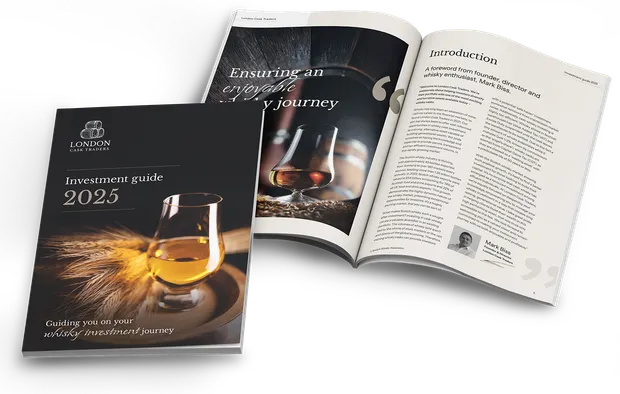
London Based Experts
Frequently Asked Questions
Press ads in...
Common Questions
Frequently asked questions
-
Is whisky a good investment at this time?
Whisky as an investment has done extremely well over the past few decades and the growth of this great market doesn’t appear to be slowing down any time soon.
Demand far outstrips supply in the whisky market. There are only a small number of distilleries still operating across Scotland and Ireland (approximately 134 in Scotland and 32 in Ireland), yet whisky is sold in around 180 markets worldwide. Scotch Whisky accounts for over 20% of all UK food and drink exports worldwide, which is a truly staggering figure.
There are new markets being created for Whisky regularly as more countries adopt the taste for it. India is an example of this as they have been importing increasing amounts over the more recent years, increasing by 20% over the first half of 2019. Japan’s whisky imports increased by 16% in the same period.
Whisky has a much more stable longevity compared to other tangible investments, and regarded as a safe haven investment in times of volatility. This is why it is widely known as ‘liquid gold’.
Whisky’s value increases with age and is more valuable whilst in cask. In November 2019, a 30 year old cask sold for almost £450,000 at an auction in Hong Kong. Past performance is never an indication of future returns, however the demand for whisky is not going anywhere anytime soon and the supply fails to match.
-
How long should I hold my investment?
We typically advise our clients to hold their whisky for a minimum of 5 years, but you are free to exit the market whenever suits you.
-
What returns could I expect to achieve?
We could expect returns of around 8-12% per annum based on historical performance. Meaning if you were to invest £20,000 into whisky casks, you could expect to sell for around £30,000 – £36,000 in five years.
-
Where do you store the whisky?
Your whisky will be stored safe in a government bonded warehouse meaning your casks will be fully insured and exempt from VAT and Excise Duty. We have contracts in place with many government bonded warehouses across Scotland and Ireland and often hold warehouse tours for our clients so they can see where their whisky is kept.
-
Why is whisky a tax free investment?
Something that happens whilst your whisky is maturing is called ‘the angel’s share’, which is the process of whisky evaporating from the barrel, accounting for an approximate 2% loss of your whisky every year. For this reason, whisky is classed as a ‘wasting asset’, meaning the asset has a predictable life of 50 years or less. For this reason, whisky is not subject to capital gains tax.
-
Can I take delivery of my cask?
When investing in whisky you can easily verify that you are the registered owner of your casks. As well as issuing you a certificate stating which casks you own with the registered number for the bonded warehouse, those details are also passed to HMRC if purchased in the UK, or the Revenue Commissioners if purchased in Ireland. You will be able to contact them and verify this so you can ensure you have full ownership of your casks for peace of mind.
We also ensure all casks are insured by one of our insurance providers so will be protected for the extremely slim chance of fire or theft. To ensure the protection of our client’s investments and to abide by the necessary laws we also undertake thorough checks on the suppliers we deal with to ensure they are genuine and legitimate.
-
How do I exit this investment?
There are a number of exit strategies available to you when you wish to sell your casks. To find out more about these, please visit our Exit Strategies page.

Start your journey
Request our brochure today
Discover why the wealthy are pouring their money into whisky for a safe, secure way to grow their capital.
What you will learn from this brochure;
- Why the whisky market has grown exponentially over the years
- The process of buying your first cask, start to finish
- Why distilleries need investors
- Why whisky is a tax free investment
- Our 5 proven exit strategies
By providing your email address, you agree to receive personalised marketing emails from us, including promotions, updates, and special offers. You can unsubscribe at any time.
